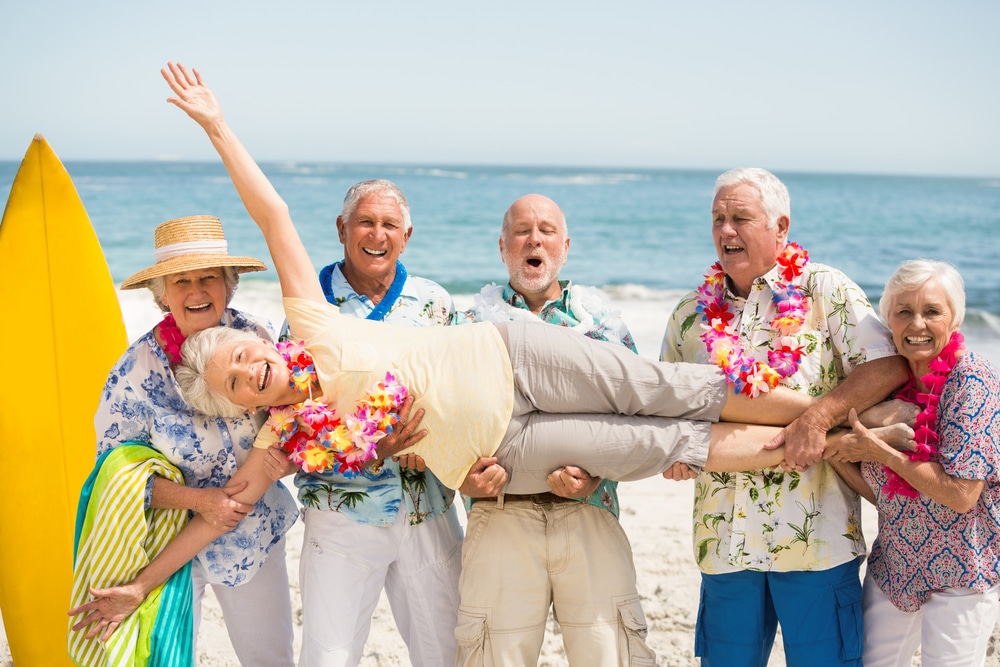Senior Vacations: Planning the perfect getaway for seasoned travelers requires careful consideration of various factors. This guide delves into the diverse world of senior travel, exploring suitable vacation styles, ideal destinations, budgeting strategies, health and safety considerations, and engaging activities to ensure a memorable and enriching experience. From relaxing cruises to adventurous excursions, we’ll cover everything needed to plan a fulfilling and comfortable trip tailored to the needs and preferences of senior adventurers.
We will examine different vacation types, popular destinations both domestically and internationally, detailed budgeting and logistical planning, essential health and safety measures, engaging activities, and efficient transportation options. This comprehensive guide aims to empower senior travelers to embark on their dream vacations with confidence and peace of mind.
Planning a Senior Vacation
Planning a senior vacation requires careful consideration of various factors to ensure a relaxing and enjoyable experience. This section will outline budgeting, logistical planning, and practical tips to help make your dream vacation a reality. We’ll cover essential aspects from financial planning to booking strategies and travel preparations, ensuring a smooth and worry-free trip.
Sample Budget for a Week-Long Senior Vacation
A well-structured budget is crucial for a stress-free vacation. This sample budget considers a week-long trip for two people to a moderately priced destination. Adjust the figures based on your chosen destination and preferred level of luxury.
| Category | Estimated Cost |
|---|---|
| Flights (round trip for two) | $1200 |
| Accommodation (7 nights, mid-range hotel) | $1400 |
| Activities (tours, entry fees, etc.) | $500 |
| Meals (restaurants and groceries) | $700 |
| Transportation (local transport, taxis) | $200 |
| Travel Insurance | $100 |
| Souvenirs & Miscellaneous | $200 |
| Total Estimated Cost | $4300 |
Tips for Booking Flights and Accommodations
Booking flights and accommodations suitable for seniors requires prioritizing ease and comfort. Consider these tips:
Booking flights should prioritize direct flights to minimize transfers and potential stress. Many airlines offer senior discounts, though these may vary. Websites like Expedia, Kayak, and Google Flights allow for comprehensive searches across multiple airlines, enabling comparison shopping. Consider booking through travel agencies for assistance with complex itineraries.
For accommodations, choose hotels with accessible rooms and amenities, such as elevators and ramps. Look for hotels near attractions to reduce the need for extensive travel. Websites like Booking.com and Hotels.com offer detailed information on hotel amenities and guest reviews, helping you make an informed decision. Consider booking hotels with airport shuttles for easy transfers.
Step-by-Step Guide for Planning a Senior Vacation
Thorough planning is essential for a successful senior vacation. Follow these steps:
1. Choose your destination and travel dates: Consider the climate, accessibility, and activities available at your chosen destination.
2. Set a budget: Determine how much you can comfortably spend on your vacation, including flights, accommodation, activities, and meals.
3. Book flights and accommodation: Prioritize direct flights and accessible accommodations.
4. Research activities and attractions: Plan activities that are suitable for your physical abilities and interests.
5. Purchase travel insurance: Protect yourself against unforeseen circumstances, such as medical emergencies or trip cancellations.
6. Check visa requirements: Ensure you have the necessary visas for your destination.
7. Pack essentials: Pack comfortable clothing, medications, and any necessary mobility aids.
8. Inform your bank and phone provider: Notify your bank and phone provider of your travel plans to avoid any issues with your cards or phone service.
9. Make copies of important documents: Make copies of your passport, tickets, and insurance information and keep them separate from the originals.
10. Share your itinerary with someone: Share your travel plans with a family member or friend so they know where you are.
Activities and Entertainment for Senior Vacations
Planning engaging and appropriate activities is crucial for a successful senior vacation. The goal is to create a balance between relaxation, exploration, and social interaction, all while respecting individual physical limitations and preferences. This ensures a memorable and enjoyable experience for all travelers.
Age-Appropriate Activities for Senior Travelers
Choosing activities that cater to varying levels of mobility and energy is essential. A well-rounded itinerary should offer a mix of options, allowing seniors to participate at their own pace and comfort level.
- Gentle Walking Tours: Exploring historical neighborhoods or scenic parks at a leisurely pace, focusing on points of interest rather than covering vast distances. Imagine strolling through a charming European village, admiring the architecture and soaking in the atmosphere, pausing frequently for rests and photo opportunities.
- Cultural Performances: Attending concerts, plays, or dance performances offers a stimulating and engaging experience. Consider smaller, more intimate venues that offer easier access and comfortable seating. For example, a local chamber music concert or a traditional folk dance performance could be both enriching and relaxing.
- Cooking Classes: Learning new culinary skills in a relaxed setting can be both fun and educational. A hands-on cooking class focused on regional cuisine provides a taste of local culture and a delicious meal to enjoy afterward. The class itself can be a social opportunity, allowing interaction with other participants.
- Museum Visits: Choosing museums with accessible entrances, elevators, and seating areas is key. Opting for smaller museums or focusing on specific exhibits within larger ones can help manage fatigue and maintain engagement. For instance, a museum focusing on a specific art period or a local history museum might be more manageable than a large, sprawling art museum.
- Relaxation and Wellness Activities: Incorporating activities like gentle yoga, tai chi, or spa treatments promotes relaxation and rejuvenation. Many resorts and hotels offer specialized programs designed for seniors, focusing on gentle movements and stress reduction techniques. A spa day featuring a massage and aromatherapy could be a highlight of the trip.
Incorporating Relaxation and Rejuvenation Techniques
Rest and rejuvenation are vital components of a successful senior vacation. Prioritizing relaxation ensures that seniors return home feeling refreshed and revitalized rather than exhausted.
Strategic planning is key. This includes scheduling downtime throughout the day, ensuring adequate sleep, and incorporating activities specifically designed for relaxation. For example, building in time for quiet reflection, reading, or simply enjoying the view from a comfortable spot can significantly enhance the overall experience. Consider including a daily meditation session or a quiet hour for journaling to promote mindfulness and reduce stress. Regular breaks during sightseeing tours allow for rest and prevent overexertion.
Accessible Cultural Experiences and Historical Sites
Many historical sites and cultural attractions offer accessible options for senior travelers. Planning ahead and researching accessibility features is crucial.
Examples include museums with wheelchair ramps and elevators, historical sites with paved pathways and accessible restrooms, and guided tours tailored to the needs of seniors. Many national parks and monuments offer accessible trails and viewing points. For instance, many historic homes have implemented accessibility improvements, including ramps and elevators, making them easier to navigate for those with mobility limitations. Researching transportation options, including accessible taxis or shuttle services, is equally important to ensure ease of movement throughout the trip. Booking tours and accommodations in advance also allows for special requests to be accommodated.
Summary
Ultimately, planning a senior vacation is about creating a personalized experience that balances relaxation, exploration, and well-being. By carefully considering the aspects outlined in this guide – from choosing the right destination and accommodation to prioritizing health and safety – seniors can embark on memorable journeys that enrich their lives and create lasting memories. Remember to tailor your trip to your specific needs and preferences, ensuring a fulfilling and enjoyable adventure that caters to your individual pace and interests. Embrace the journey!




